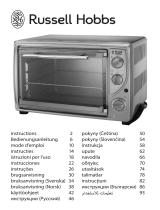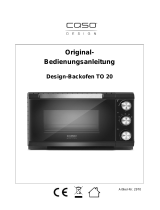Then slide the second fi xing bracket on the spit and push it fi rmly into the chicken. Also
tighten this screw.
• Check that the chicken is properly centred on the spit.
• Tightly truss the chicken with a heat-proof cotton string suitable for food to prevent any
meat parts from getting in contact with the heating elements.
• By means of the rotisserie handle you can now lift the rotisserie assembly into the oven.
Firstly, insert the spit with the pointed end in the hole on the right hand side of the
interior oven and then place it in the support provided on the left hand side.
• Attention! Hazard of fi re! Make sure that the meat to be grilled is rotating properly and
that it does not touch the heating elements – otherwise the meat might catch fi re.
• Important! Insert the roasting/baking tray into the lowest level.
At this function, the roasting/baking tray serves as collecting tray for dripping
grease. The appliance stays clean.
At this function, we recommend fi lling half of the roasting/baking tray with water –
the rising steam makes your grill food especially tender.
Furthermore, it serves as collecting tray for dripping grease.
The appliance stays clean.
3. Setting the temperature
Set the desired temperature by means of the upper rotary knob.
4. Activating the appliance (with or without timer)
You have two possibilities to put the oven into operation:
1. Manual operation: To put the appliance into operation, turn the lower rotary knob to
the left to the manual setting “M”. In this case the appliance will not switch off automati-
cally. To cut off you have to reset the rotary knob to “0” position.
2. Time-controlled operation: To put the appliance into operation, turn the lower rotary
knob to the right as far as it will go and then back to the requested operating time. The
clock will switch the appliance off automatically after the selected time has elapsed and
you will hear a short ring. The selected time can be adjusted at any time even during
operation by turning the knob to the left or to the right.
5. Switching the appliance off
The appliance will switch off automatically if it is operated via the timer. At manual operation,
the rotary knob has to be set back to “0”.
We recommend pulling the mains plug after each use.
• Taking ready food out
Open the oven door (do not use the open door as storage place!). Take the ready food out of
the oven chamber. If you want to take the roasting/baking tray, the grill grid or the rotisserie
spit out of the oven in hot condition, protect your hands by using potholders or a grill glove.
Close the oven door.
6. Interior illumination
The appliance features an interior illumination. The lamp glows during the whole operating
time. The lamp goes off automatically when fi nishing the operation.
Replacing the oven lamp
• Always pull the mains plug and allow the appliance to cool down before replacing the lamp!
• Remove the lamp cover carefully and unscrew the defect lamp.
• Set the new lamp (heat-resistant – 230 V~ 15 W, E15, T 300 °C) into the thread and screw it in
hand-tight, afterwards set the lamp cover into the thread and also screw it in hand-tight.
7. Temperature pilot lamp
The appliance is equipped with a temperature pilot lamp. When the pilot lamp goes off, the set
17










